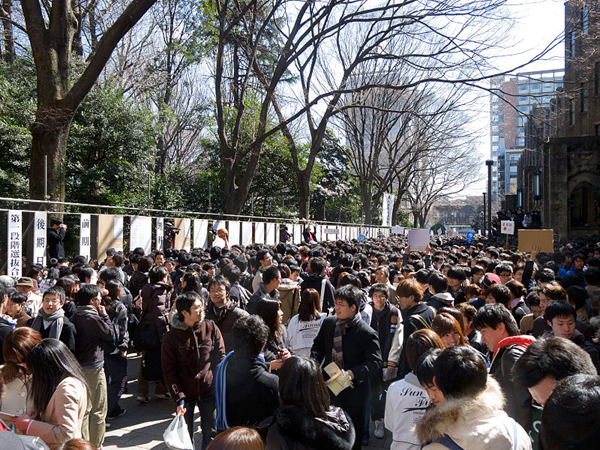“All right, please tell me something about your strong points. You have 60 seconds.”
“Hai.” [Clears throat] “My strong point is the ability to act as a leader. I served as sub-leader of our school’s tennis club. Through planning weekend retreats and so on, I learned about the difficulties of getting people to work together. I feel the leadership I gained from my experience will also be useful at your company.”
Very impressive, writes Shukan Gendai. Except that the student candidate was almost certainly only mouthing what he’d memorized and had been rehearsing for days in front of a mirror. What’s more, the “sub-leader” position was an exaggeration. Actually he’d just been a rank-and-file member of the tennis club — but who ever takes the trouble to check such things? Grunting an acknowledgement, the interviewer pretends to scribble down something on his note pad. “After listening to dozens of job seekers, an interviewer knows when he’s being fed a line,” says a personnel manager in the IT sector in charge of human resources. “If he presses for more details, the candidate usually lapses into vagueness.”
Shukan Gendai describe the whole charade as “Fools using a foolish method to pick fools,” and is convinced this system will ultimately be responsible for bringing the country to ruin. Don’t just blame the students: the people entrusted to conduct recruitment interviews are mostly rank amateurs who don’t know what they’re doing either.
“If the companies only ask the kind of questions that candidates have prepped for, they’ll get no insights into their character or ability to use their minds,” points out Taiichiro Tsuji, a recruitment consultant. “So they try throwing curve balls, with batty questions like, ‘If you were to describe yourself as an animal, which one would you be?’ It’s like asking a stage comedian to ‘Tell me a one-liner,’ at a casting session, with the subject’s fate decided by his or her ability to come up with a glib response. This serves as proof of interviewers’ dismal abilities to ask relevant questions to candidates.”
In one of the more extreme examples, an interviewer glanced at a candidate’s resume and noticed that he happened to be a fan of a certain singer. So he asked, “Do you like this singer? What’s your favorite song by him? I also happen to like his current album…” “The first and second rounds of interviews are conducted by company staff from outside the personnel department, who might receive two hours of orientation,” says the aforementioned IT personnel manager. “You could say nearly all of them are amateurs. Their general response to any remark is usually to say ‘Hmmmm?’ They can’t stick to the main subject of the conversation or come up with any penetrating questions. This is bad for the students as well. To be frank, the whole thing is pathetic.”
“These days, all job seekers will tell you is how great they are,” says author Ayako Sono. “Job candidates reply to questions with the same cookie-cutter responses. With the exception of their being asked concerning topics that demand some specialized knowledge, there’s no way of determining how well someone has been educated, his personal character, and his individuality. With the system as it is now, you’re never going to obtain any understanding of what he or she is really like.”
“During students’ first two years in university, they can goof off, and then from their junior year they embark on job hunting,” says mathematician Masahiko Fujiwara. “That is no way to get an education. “Japan’s politicians and bureaucrats are in the same boat,” Fujiwara adds. “Even for those who score near the top, the system is set up to create only people who know how to react to symptoms, but who lack any long-term vision. Isn’t that why today’s Japan is drifting aimlessly?”



Comments
This is why reactionary questions are the best, because they put canidates in a hot spot they’ll most likely face when in the workplace. Or maybe never at all, but seeing how they react and what they will do in the situation you placed in front of them will determine what kind of employee they will be, for example:
“You’ve just sat down at your desk and your boss asks you why you haven’t handed him last weeks revenue graphs. You have eight tenths of a second to respond. Go.”
How the question is asked and what words are used are both key to these questions. Being creative helps too but not to the point where you’re asking something like:
“You’re in Prague. A sniper’s in the window above you. There’s an
alligator behind you, and a grizzly bear in front of you. What do you
do?”
I agree. I wonder what’s to be gained by having non-qualified interviewers in the first two rounds? Bad filter = semi-random results?
True enough: the interviewer should know enough about kids right out of school to know what they’re likely – and unlikely – to be prepared to do to present themselves in the best light.